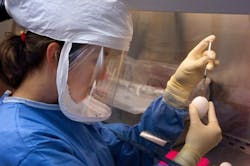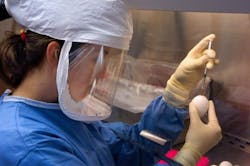Will pharma’s record-breaking race for a coronavirus vax pay off?
If a pharma company succeeded in developing a vaccine for the coronavirus in the timeframe many have promised, it would be a historic milestone for the industry.
Since cases of the novel coronavirus in China were first reported over a month ago, the pharma world has been mobilizing at a breakneck speed to develop a vaccine or come up with an effective treatment. A range of companies have jumped into the race including Novavax, Moderna and Inovio Pharmaceuticals. Now that Johnson & Johnson has announced its efforts to develop a vaccine, Big Pharma is in the hunt as well.
Although J&J has estimated that it could take up to a year before a vaccine is ready for human trials, Moderna and Inovio are promising a much shorter timeline of just three months before their products are ready for testing. Just how ambitious is that goal?
According to Avery Levine, director of custom intelligence at Informa Pharma Intelligence, the mean timeframe for bringing a vaccine to market for a company of any size — from clinical trials to regulatory approval — is about 10 years.
“What [these companies] are promising is obviously a drastically shrunken timeframe,” she says.
Of course, this isn’t pharma's first rodeo. By comparison, Levine says that the industry was able to get a vaccine for Ebola approved in about four years. With Zika, companies had products ready for testing within seven months. Pharma companies also had a vaccine ready for human trials after the SARS outbreak in less than a year — but by that time the outbreak had dwindled and it became too difficult to find enough patients for testing.
According to Levine, advancements in technology are enabling companies to develop vaccines a faster clip. They are also able to build on development templates created by past outbreaks such as SARS.
J&J, for example, has reported that it plans to use the AdVac and PER.c6 platforms of its Janssen Pharmaceutical Companies, which were used to develop its Ebola and Zika vaccines.
In the short term, the efforts of these companies have been a boon to their stock values. Late last week, shares for Novavax rose by 20 percent, while Moderna and Inovio saw their stocks values spike by 7.7 percent and 25 percent (respectively), before leveling out in the next few days of trading.
Levine says that whether or not the efforts by these companies will end up being a long-term financial risk “remains to be seen.”
Research in 2018 by The Coalition for Epidemic Preparedness studied the vaccine development of 11 priority epidemic infectious diseases and showed that the average cost for developing a vaccine from preclinical trials through the end of phase 2a ranges from $31-68 million — assuming that there’s no failures along the way. When development roadblocks are factored into the equation, the cost skyrockets to $84-112 million.
Some companies have turned to grants to help fund their development efforts. Inovio, for example, reported that it has partnered with the Wistar Institute in Philadelphia and received a grant worth up to $9 million.
And as Levine notes, even if companies get a vaccine to human trials, there’s no guarantee that they will work — or that they can be quickly manufactured on a scale needed for distribution.
Despite the hype around pharma making a vaccine, experts predict that it could be years before one crosses the regulatory finish line and is ready for use. If the pattern of SARS is any indication — that virus was contained within about seven months — it may be too late for companies to capitalize on their efforts. J&J’s CSO, Dr. Paul Stoffels, has stated that there's little financial incentive in the endeavor. But Levine says there is more to be gained for the industry than turning a quick buck.
“The companies are being forthright that there isn’t a huge financial gain to commercialization,” she says. “You have to instead do it in the public interest.
“If the epidemic is over in a few months, we are all happy,” Stoffels recently told the Philadelphia Inquirer. “If it’s not and it expands, then we have gained many months of time to come up with a vaccine. We’ll be able to protect more people from getting the disease. That’s what we do.”
China’s Health Commission reported on Sunday that the death toll from coronavirus had officially surpassed the death toll of 349 in mainland China from SARS. As of Tuesday morning, the official death toll from the coronavirus was 427. But the number of those who have recovered from the coronavirus is also rising and as of Sunday, reached 475.

